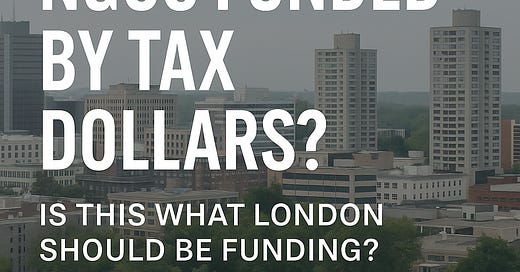Public Money, Private Agendas: Rethinking Municipal Grants to NGOs
Why ideological nonprofits like the London Environmental Network deserve closer scrutiny in a time of fiscal crisis
London City Council last year approved a four-year budget (2024–2027) that includes over 30% in cumulative property tax increases. Officials have justified this as necessary to preserve core services under growing economic pressure. But with residents now paying hundreds more per year, a serious question must be asked:
Are all current spending priorities truly essential?
One category of spending that has largely avoided public scrutiny is the City’s ongoing financial support for non-governmental organizations (NGOs) — including nonprofits whose activities go well beyond service delivery and into ideological advocacy.
The Case of the London Environmental Network (LEN)
The London Environmental Network (LEN) exemplifies this issue. Although LEN promotes itself as an environmental group, a review of its leadership, programming, and communications reveals a distinct ideological framework.
Among its staff and board:
“Climate justice,” “racial justice,” and “anti-capitalism” are recurring themes
Staff bios include references to intersectionality, DEI, and gender identity activism
Partnerships and committee memberships extend to groups like Climate Strike Canada and Atlohsa Family Healing Services, both politically active organizations
LEN embraces UN Sustainable Development Goals (SDGs) and other global policy frameworks that align with controversial “just transition” narratives
This is not simply an organization planting trees or protecting local waterways. LEN increasingly acts as a communications and consulting hub for social justice advocacy—under the umbrella of “sustainability.”
Blurring the Line Between Service and Advocacy
This trend is not unique to LEN. London is home to dozens — if not hundreds — of NGOs and nonprofit groups that receive taxpayer funding through various city programs, grants, or partnerships.
And yet, when one of our members at CCAL asked the City to clarify:
How many NGOs are currently receiving municipal support
Which departments are responsible for oversight
And what measurable outcomes are being tracked
We were told that such information is not publicly available — and that we would need to submit a formal Freedom of Information (FOI) request just to obtain the full list.
This lack of transparency is unacceptable. At a time when Londoners are facing sharp tax increases and deteriorating public services, they deserve to know exactly:
Where their money is going
What they are funding
And whether those expenditures reflect real priorities
Without that information, ideological advocacy and political activism are quietly being subsidized — under the radar and without consent.
In a Time of Crisis, Priorities Matter
London faces urgent and visible challenges:
A worsening homelessness and addiction crisis
Increased public disorder and safety concerns, particularly downtown
Crumbling infrastructure and overextended emergency services
These are not abstract issues — they affect every resident. And they are precisely the kinds of core services that taxpayers believe they are funding when faced with annual increases of 7–9%.
Instead, money is being allocated — often quietly — to ideologically aligned nonprofits, while emergency shelters remain underfunded, addiction recovery programs have waitlists, and police are stretched thin.
This is not a question of right versus left. It is a question of governance, accountability, and fiscal responsibility.
The Path Forward: Transparency and Restraint
CCAL is calling on London City Council to:
Conduct a full audit of all NGO and nonprofit funding, broken down by department, program, and outcome
Differentiate between essential service providers and ideological advocacy groups
Suspend non-essential grants during the current budget cycle, with exceptions only for demonstrable service gaps
Reaffirm the City’s obligation to prioritize taxpayer funds for core responsibilities: housing, public safety, infrastructure, and frontline social support
If the City cannot afford to resolve our worsening homelessness and addiction crisis, then it certainly cannot justify subsidizing organizations whose primary focus is advocacy rather than frontline service.
A Real-Time Example
Shortly after this article was drafted, CCAL received a newsletter from the London Environmental Network promoting a new initiative called “Sustainability Socials.” While presented as community engagement events, the newsletter confirms many of the concerns outlined above.
The invitation includes:
Guided tours of LEED-certified buildings
Networking between “nonprofit leaders, local businesses, students, and policymakers”
Raffle prizes, catered refreshments, and professional-grade event coordination
Future sessions focused on themes like “Sustainable Food Systems”
None of this is inherently problematic — but it underscores a growing trend:
Publicly funded organizations hosting ideologically branded social functions while urgent issues like homelessness, addiction, and public disorder remain unaddressed.
This is exactly the kind of spending that deserves public scrutiny. These events may serve a purpose, but are they a priority in a city facing deep financial and social challenges?
We believe City Council must take a hard look at what kinds of outcomes these programs are producing, and whether they represent the best use of limited public resources.
A Final Word
This is not an attack on any one organization. It is a necessary recalibration of priorities in the face of an affordability crisis for residents and a credibility crisis for City Hall.
The people of London are generous. They are not opposed to charitable work. But they expect their elected representatives to exercise judgment — and to ensure that public money serves the public good, not private agendas.
We encourage all Londoners to speak up.
CCAL will continue digging into this issue.
If you have tips, questions, or stories to share, visit us at:
🌐 www.ccal.info
📧 Email: ccal.info2030@gmail.com
Let’s demand accountability, not ideology — and results, not slogans.





This is downright wrong
Canadians give money out like it should happen
NGOs are no longer needed and we need to stop giving them our monies to "help" other countries